The Complexities of Multiculturalism in Early Childhood Education
VerifiedAdded on 2023/04/07
|16
|3749
|294
Essay
AI Summary
This essay delves into the significant correlation between education and culture, emphasizing how the cultural backgrounds of teachers and students shape the learning environment in early childhood settings. It addresses the pressing issue of multiculturalism, defined as the coexistence of diverse cultures within a classroom, and its impact on children, families, and educators. The essay examines the advantages, such as fostering creativity and cultural understanding, and disadvantages, including potential academic and social challenges. It highlights the importance of teacher preparation, curriculum adaptation, and parental involvement to create an inclusive and supportive multicultural learning environment. The essay also discusses specific issues like language barriers, curriculum orientation, and trust issues, while also acknowledging the benefits of multicultural classrooms, such as the mental enhancement of children in diverse communities. The assignment provides a comprehensive analysis of the ongoing issue of multiculturalism in early childhood education, focusing on its impact on the educational process and the strategies needed to address the challenges and maximize the benefits.

Running head: PSYCHOLOGY
Topic: PSYCHOLOGY
Name of the Student:
Name of the University:
Author’s Note:
Topic: PSYCHOLOGY
Name of the Student:
Name of the University:
Author’s Note:
Paraphrase This Document
Need a fresh take? Get an instant paraphrase of this document with our AI Paraphraser
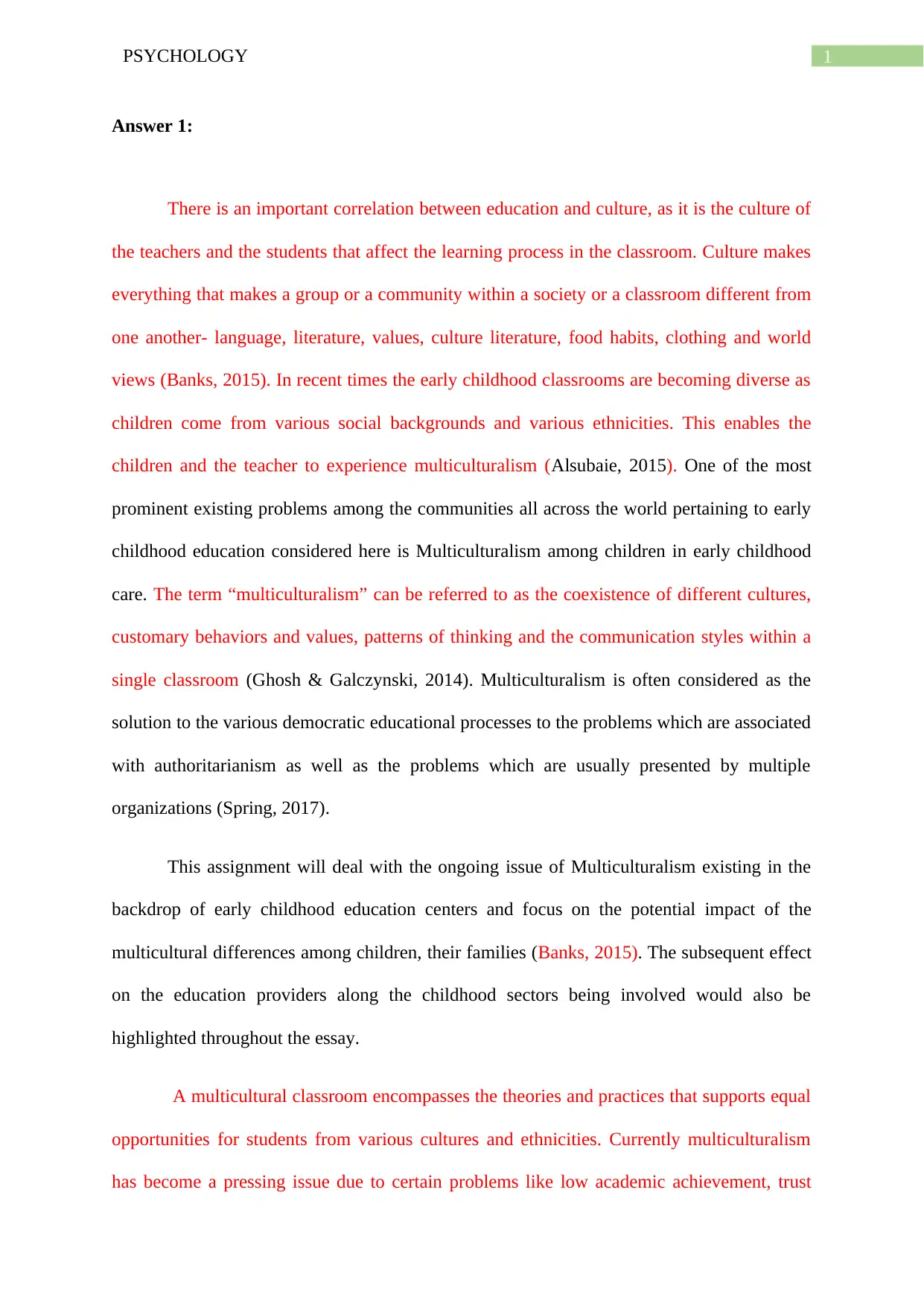
1PSYCHOLOGY
Answer 1:
There is an important correlation between education and culture, as it is the culture of
the teachers and the students that affect the learning process in the classroom. Culture makes
everything that makes a group or a community within a society or a classroom different from
one another- language, literature, values, culture literature, food habits, clothing and world
views (Banks, 2015). In recent times the early childhood classrooms are becoming diverse as
children come from various social backgrounds and various ethnicities. This enables the
children and the teacher to experience multiculturalism (Alsubaie, 2015). One of the most
prominent existing problems among the communities all across the world pertaining to early
childhood education considered here is Multiculturalism among children in early childhood
care. The term “multiculturalism” can be referred to as the coexistence of different cultures,
customary behaviors and values, patterns of thinking and the communication styles within a
single classroom (Ghosh & Galczynski, 2014). Multiculturalism is often considered as the
solution to the various democratic educational processes to the problems which are associated
with authoritarianism as well as the problems which are usually presented by multiple
organizations (Spring, 2017).
This assignment will deal with the ongoing issue of Multiculturalism existing in the
backdrop of early childhood education centers and focus on the potential impact of the
multicultural differences among children, their families (Banks, 2015). The subsequent effect
on the education providers along the childhood sectors being involved would also be
highlighted throughout the essay.
A multicultural classroom encompasses the theories and practices that supports equal
opportunities for students from various cultures and ethnicities. Currently multiculturalism
has become a pressing issue due to certain problems like low academic achievement, trust
Answer 1:
There is an important correlation between education and culture, as it is the culture of
the teachers and the students that affect the learning process in the classroom. Culture makes
everything that makes a group or a community within a society or a classroom different from
one another- language, literature, values, culture literature, food habits, clothing and world
views (Banks, 2015). In recent times the early childhood classrooms are becoming diverse as
children come from various social backgrounds and various ethnicities. This enables the
children and the teacher to experience multiculturalism (Alsubaie, 2015). One of the most
prominent existing problems among the communities all across the world pertaining to early
childhood education considered here is Multiculturalism among children in early childhood
care. The term “multiculturalism” can be referred to as the coexistence of different cultures,
customary behaviors and values, patterns of thinking and the communication styles within a
single classroom (Ghosh & Galczynski, 2014). Multiculturalism is often considered as the
solution to the various democratic educational processes to the problems which are associated
with authoritarianism as well as the problems which are usually presented by multiple
organizations (Spring, 2017).
This assignment will deal with the ongoing issue of Multiculturalism existing in the
backdrop of early childhood education centers and focus on the potential impact of the
multicultural differences among children, their families (Banks, 2015). The subsequent effect
on the education providers along the childhood sectors being involved would also be
highlighted throughout the essay.
A multicultural classroom encompasses the theories and practices that supports equal
opportunities for students from various cultures and ethnicities. Currently multiculturalism
has become a pressing issue due to certain problems like low academic achievement, trust
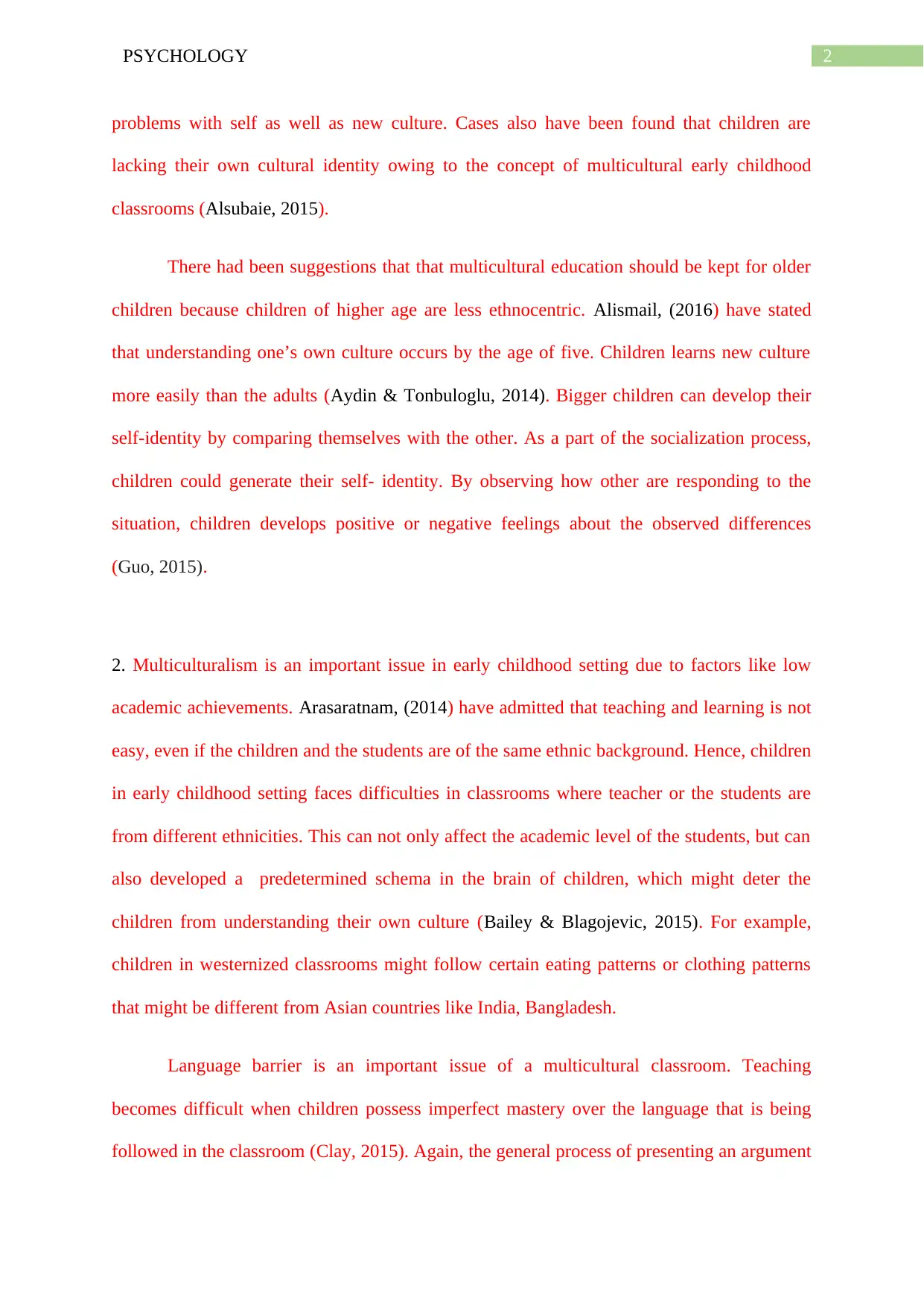
2PSYCHOLOGY
problems with self as well as new culture. Cases also have been found that children are
lacking their own cultural identity owing to the concept of multicultural early childhood
classrooms (Alsubaie, 2015).
There had been suggestions that that multicultural education should be kept for older
children because children of higher age are less ethnocentric. Alismail, (2016) have stated
that understanding one’s own culture occurs by the age of five. Children learns new culture
more easily than the adults (Aydin & Tonbuloglu, 2014). Bigger children can develop their
self-identity by comparing themselves with the other. As a part of the socialization process,
children could generate their self- identity. By observing how other are responding to the
situation, children develops positive or negative feelings about the observed differences
(Guo, 2015).
2. Multiculturalism is an important issue in early childhood setting due to factors like low
academic achievements. Arasaratnam, (2014) have admitted that teaching and learning is not
easy, even if the children and the students are of the same ethnic background. Hence, children
in early childhood setting faces difficulties in classrooms where teacher or the students are
from different ethnicities. This can not only affect the academic level of the students, but can
also developed a predetermined schema in the brain of children, which might deter the
children from understanding their own culture (Bailey & Blagojevic, 2015). For example,
children in westernized classrooms might follow certain eating patterns or clothing patterns
that might be different from Asian countries like India, Bangladesh.
Language barrier is an important issue of a multicultural classroom. Teaching
becomes difficult when children possess imperfect mastery over the language that is being
followed in the classroom (Clay, 2015). Again, the general process of presenting an argument
problems with self as well as new culture. Cases also have been found that children are
lacking their own cultural identity owing to the concept of multicultural early childhood
classrooms (Alsubaie, 2015).
There had been suggestions that that multicultural education should be kept for older
children because children of higher age are less ethnocentric. Alismail, (2016) have stated
that understanding one’s own culture occurs by the age of five. Children learns new culture
more easily than the adults (Aydin & Tonbuloglu, 2014). Bigger children can develop their
self-identity by comparing themselves with the other. As a part of the socialization process,
children could generate their self- identity. By observing how other are responding to the
situation, children develops positive or negative feelings about the observed differences
(Guo, 2015).
2. Multiculturalism is an important issue in early childhood setting due to factors like low
academic achievements. Arasaratnam, (2014) have admitted that teaching and learning is not
easy, even if the children and the students are of the same ethnic background. Hence, children
in early childhood setting faces difficulties in classrooms where teacher or the students are
from different ethnicities. This can not only affect the academic level of the students, but can
also developed a predetermined schema in the brain of children, which might deter the
children from understanding their own culture (Bailey & Blagojevic, 2015). For example,
children in westernized classrooms might follow certain eating patterns or clothing patterns
that might be different from Asian countries like India, Bangladesh.
Language barrier is an important issue of a multicultural classroom. Teaching
becomes difficult when children possess imperfect mastery over the language that is being
followed in the classroom (Clay, 2015). Again, the general process of presenting an argument
⊘ This is a preview!⊘
Do you want full access?
Subscribe today to unlock all pages.

Trusted by 1+ million students worldwide
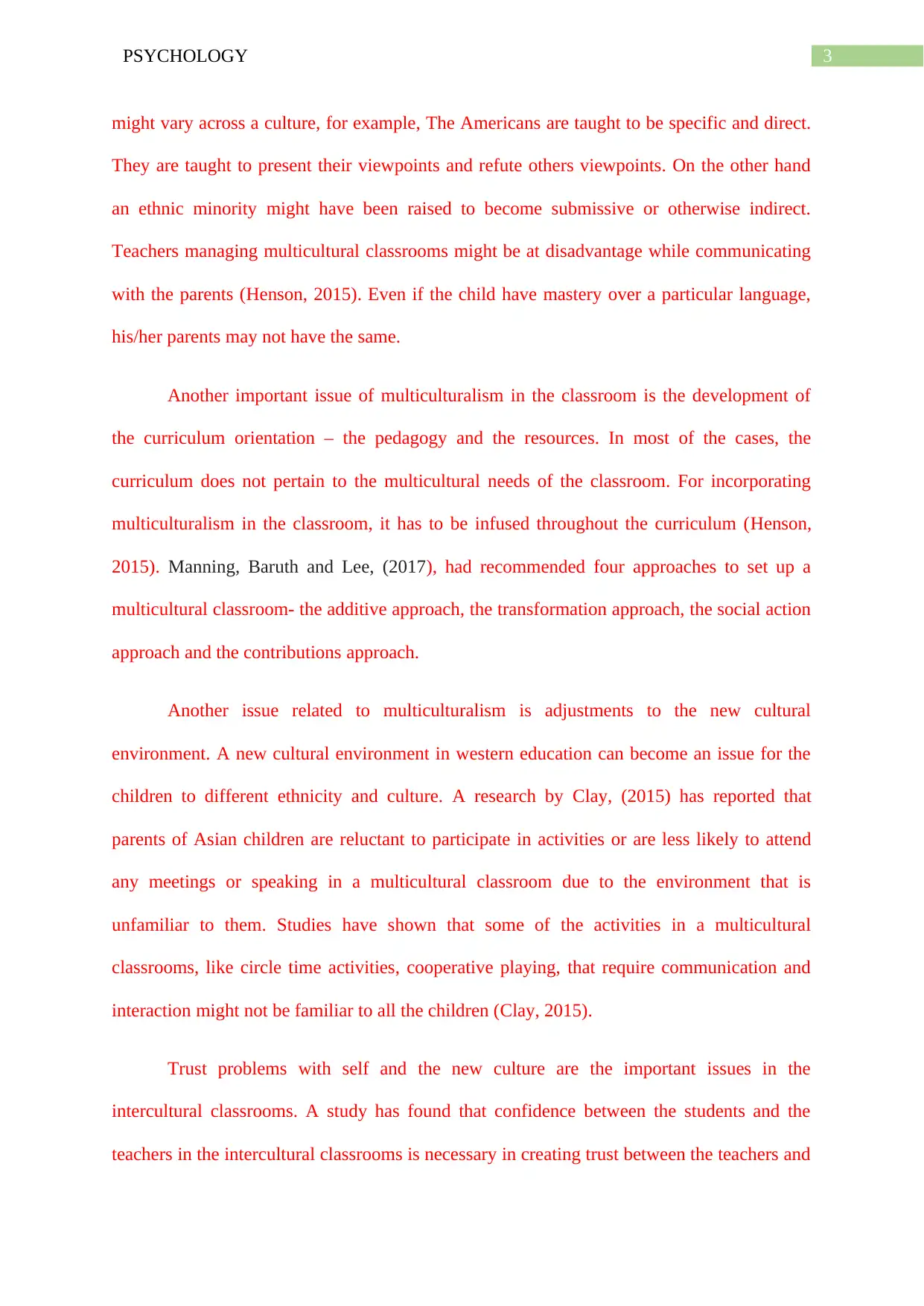
3PSYCHOLOGY
might vary across a culture, for example, The Americans are taught to be specific and direct.
They are taught to present their viewpoints and refute others viewpoints. On the other hand
an ethnic minority might have been raised to become submissive or otherwise indirect.
Teachers managing multicultural classrooms might be at disadvantage while communicating
with the parents (Henson, 2015). Even if the child have mastery over a particular language,
his/her parents may not have the same.
Another important issue of multiculturalism in the classroom is the development of
the curriculum orientation – the pedagogy and the resources. In most of the cases, the
curriculum does not pertain to the multicultural needs of the classroom. For incorporating
multiculturalism in the classroom, it has to be infused throughout the curriculum (Henson,
2015). Manning, Baruth and Lee, (2017), had recommended four approaches to set up a
multicultural classroom- the additive approach, the transformation approach, the social action
approach and the contributions approach.
Another issue related to multiculturalism is adjustments to the new cultural
environment. A new cultural environment in western education can become an issue for the
children to different ethnicity and culture. A research by Clay, (2015) has reported that
parents of Asian children are reluctant to participate in activities or are less likely to attend
any meetings or speaking in a multicultural classroom due to the environment that is
unfamiliar to them. Studies have shown that some of the activities in a multicultural
classrooms, like circle time activities, cooperative playing, that require communication and
interaction might not be familiar to all the children (Clay, 2015).
Trust problems with self and the new culture are the important issues in the
intercultural classrooms. A study has found that confidence between the students and the
teachers in the intercultural classrooms is necessary in creating trust between the teachers and
might vary across a culture, for example, The Americans are taught to be specific and direct.
They are taught to present their viewpoints and refute others viewpoints. On the other hand
an ethnic minority might have been raised to become submissive or otherwise indirect.
Teachers managing multicultural classrooms might be at disadvantage while communicating
with the parents (Henson, 2015). Even if the child have mastery over a particular language,
his/her parents may not have the same.
Another important issue of multiculturalism in the classroom is the development of
the curriculum orientation – the pedagogy and the resources. In most of the cases, the
curriculum does not pertain to the multicultural needs of the classroom. For incorporating
multiculturalism in the classroom, it has to be infused throughout the curriculum (Henson,
2015). Manning, Baruth and Lee, (2017), had recommended four approaches to set up a
multicultural classroom- the additive approach, the transformation approach, the social action
approach and the contributions approach.
Another issue related to multiculturalism is adjustments to the new cultural
environment. A new cultural environment in western education can become an issue for the
children to different ethnicity and culture. A research by Clay, (2015) has reported that
parents of Asian children are reluctant to participate in activities or are less likely to attend
any meetings or speaking in a multicultural classroom due to the environment that is
unfamiliar to them. Studies have shown that some of the activities in a multicultural
classrooms, like circle time activities, cooperative playing, that require communication and
interaction might not be familiar to all the children (Clay, 2015).
Trust problems with self and the new culture are the important issues in the
intercultural classrooms. A study has found that confidence between the students and the
teachers in the intercultural classrooms is necessary in creating trust between the teachers and
Paraphrase This Document
Need a fresh take? Get an instant paraphrase of this document with our AI Paraphraser
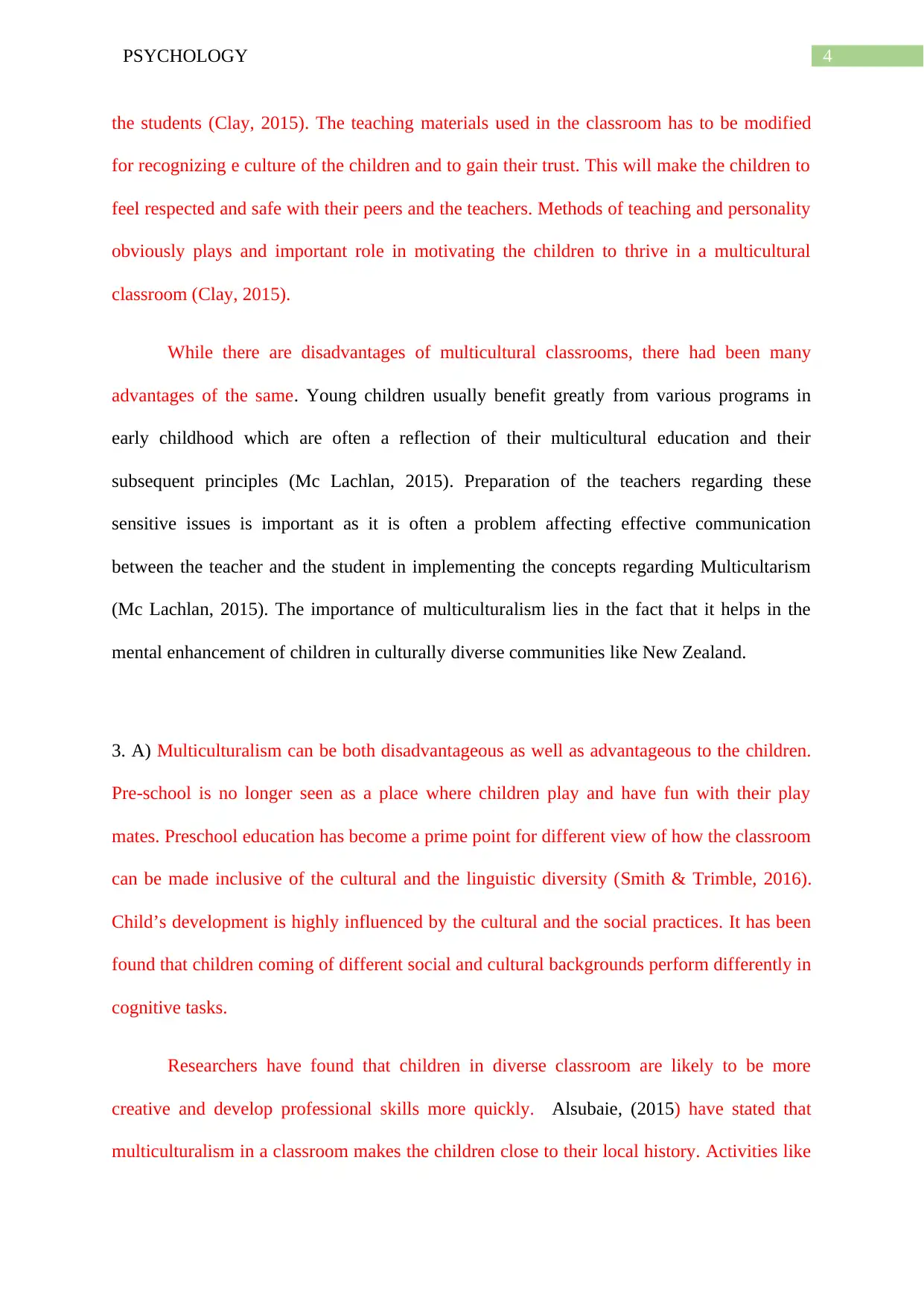
4PSYCHOLOGY
the students (Clay, 2015). The teaching materials used in the classroom has to be modified
for recognizing e culture of the children and to gain their trust. This will make the children to
feel respected and safe with their peers and the teachers. Methods of teaching and personality
obviously plays and important role in motivating the children to thrive in a multicultural
classroom (Clay, 2015).
While there are disadvantages of multicultural classrooms, there had been many
advantages of the same. Young children usually benefit greatly from various programs in
early childhood which are often a reflection of their multicultural education and their
subsequent principles (Mc Lachlan, 2015). Preparation of the teachers regarding these
sensitive issues is important as it is often a problem affecting effective communication
between the teacher and the student in implementing the concepts regarding Multicultarism
(Mc Lachlan, 2015). The importance of multiculturalism lies in the fact that it helps in the
mental enhancement of children in culturally diverse communities like New Zealand.
3. A) Multiculturalism can be both disadvantageous as well as advantageous to the children.
Pre-school is no longer seen as a place where children play and have fun with their play
mates. Preschool education has become a prime point for different view of how the classroom
can be made inclusive of the cultural and the linguistic diversity (Smith & Trimble, 2016).
Child’s development is highly influenced by the cultural and the social practices. It has been
found that children coming of different social and cultural backgrounds perform differently in
cognitive tasks.
Researchers have found that children in diverse classroom are likely to be more
creative and develop professional skills more quickly. Alsubaie, (2015) have stated that
multiculturalism in a classroom makes the children close to their local history. Activities like
the students (Clay, 2015). The teaching materials used in the classroom has to be modified
for recognizing e culture of the children and to gain their trust. This will make the children to
feel respected and safe with their peers and the teachers. Methods of teaching and personality
obviously plays and important role in motivating the children to thrive in a multicultural
classroom (Clay, 2015).
While there are disadvantages of multicultural classrooms, there had been many
advantages of the same. Young children usually benefit greatly from various programs in
early childhood which are often a reflection of their multicultural education and their
subsequent principles (Mc Lachlan, 2015). Preparation of the teachers regarding these
sensitive issues is important as it is often a problem affecting effective communication
between the teacher and the student in implementing the concepts regarding Multicultarism
(Mc Lachlan, 2015). The importance of multiculturalism lies in the fact that it helps in the
mental enhancement of children in culturally diverse communities like New Zealand.
3. A) Multiculturalism can be both disadvantageous as well as advantageous to the children.
Pre-school is no longer seen as a place where children play and have fun with their play
mates. Preschool education has become a prime point for different view of how the classroom
can be made inclusive of the cultural and the linguistic diversity (Smith & Trimble, 2016).
Child’s development is highly influenced by the cultural and the social practices. It has been
found that children coming of different social and cultural backgrounds perform differently in
cognitive tasks.
Researchers have found that children in diverse classroom are likely to be more
creative and develop professional skills more quickly. Alsubaie, (2015) have stated that
multiculturalism in a classroom makes the children close to their local history. Activities like
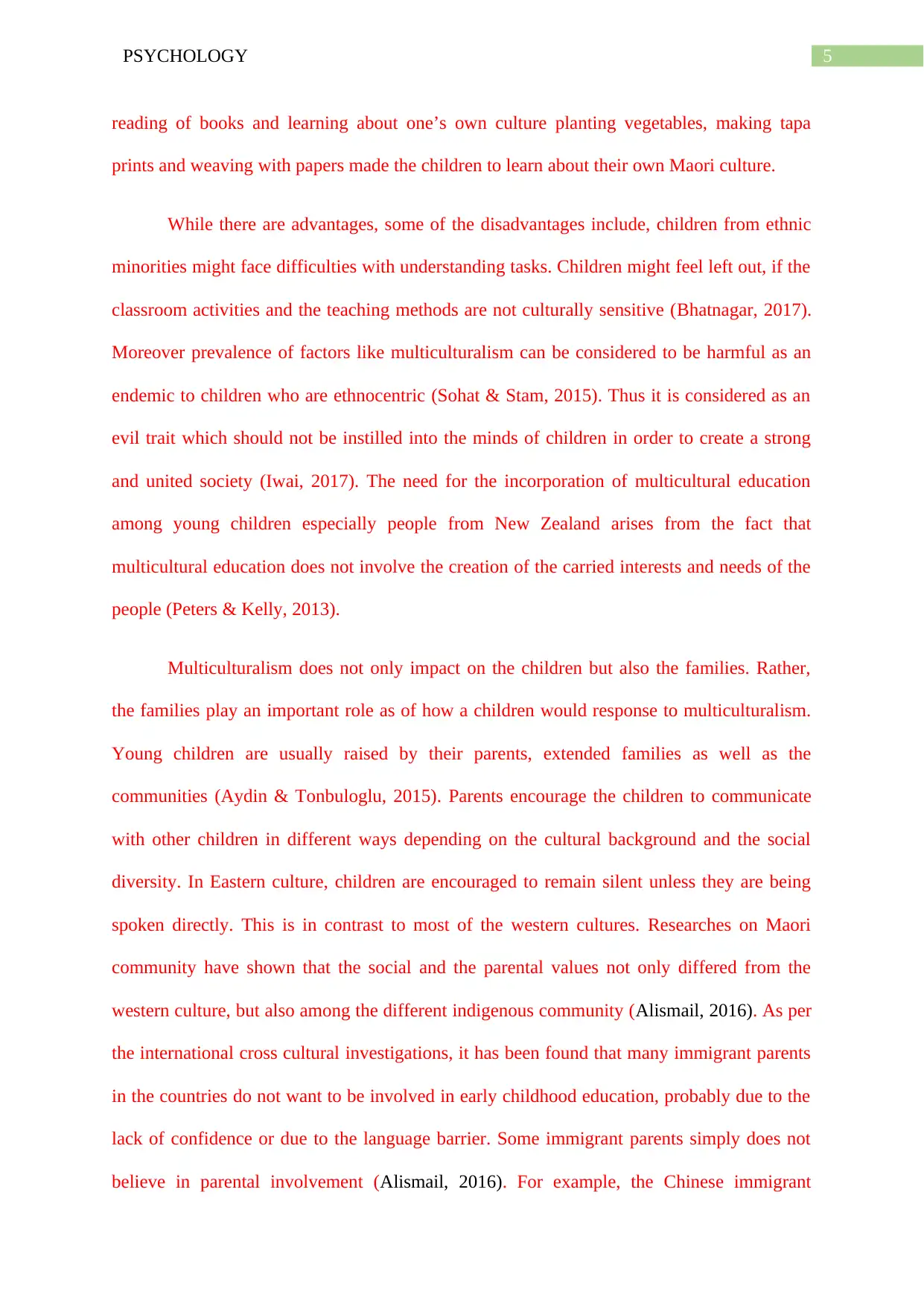
5PSYCHOLOGY
reading of books and learning about one’s own culture planting vegetables, making tapa
prints and weaving with papers made the children to learn about their own Maori culture.
While there are advantages, some of the disadvantages include, children from ethnic
minorities might face difficulties with understanding tasks. Children might feel left out, if the
classroom activities and the teaching methods are not culturally sensitive (Bhatnagar, 2017).
Moreover prevalence of factors like multiculturalism can be considered to be harmful as an
endemic to children who are ethnocentric (Sohat & Stam, 2015). Thus it is considered as an
evil trait which should not be instilled into the minds of children in order to create a strong
and united society (Iwai, 2017). The need for the incorporation of multicultural education
among young children especially people from New Zealand arises from the fact that
multicultural education does not involve the creation of the carried interests and needs of the
people (Peters & Kelly, 2013).
Multiculturalism does not only impact on the children but also the families. Rather,
the families play an important role as of how a children would response to multiculturalism.
Young children are usually raised by their parents, extended families as well as the
communities (Aydin & Tonbuloglu, 2015). Parents encourage the children to communicate
with other children in different ways depending on the cultural background and the social
diversity. In Eastern culture, children are encouraged to remain silent unless they are being
spoken directly. This is in contrast to most of the western cultures. Researches on Maori
community have shown that the social and the parental values not only differed from the
western culture, but also among the different indigenous community (Alismail, 2016). As per
the international cross cultural investigations, it has been found that many immigrant parents
in the countries do not want to be involved in early childhood education, probably due to the
lack of confidence or due to the language barrier. Some immigrant parents simply does not
believe in parental involvement (Alismail, 2016). For example, the Chinese immigrant
reading of books and learning about one’s own culture planting vegetables, making tapa
prints and weaving with papers made the children to learn about their own Maori culture.
While there are advantages, some of the disadvantages include, children from ethnic
minorities might face difficulties with understanding tasks. Children might feel left out, if the
classroom activities and the teaching methods are not culturally sensitive (Bhatnagar, 2017).
Moreover prevalence of factors like multiculturalism can be considered to be harmful as an
endemic to children who are ethnocentric (Sohat & Stam, 2015). Thus it is considered as an
evil trait which should not be instilled into the minds of children in order to create a strong
and united society (Iwai, 2017). The need for the incorporation of multicultural education
among young children especially people from New Zealand arises from the fact that
multicultural education does not involve the creation of the carried interests and needs of the
people (Peters & Kelly, 2013).
Multiculturalism does not only impact on the children but also the families. Rather,
the families play an important role as of how a children would response to multiculturalism.
Young children are usually raised by their parents, extended families as well as the
communities (Aydin & Tonbuloglu, 2015). Parents encourage the children to communicate
with other children in different ways depending on the cultural background and the social
diversity. In Eastern culture, children are encouraged to remain silent unless they are being
spoken directly. This is in contrast to most of the western cultures. Researches on Maori
community have shown that the social and the parental values not only differed from the
western culture, but also among the different indigenous community (Alismail, 2016). As per
the international cross cultural investigations, it has been found that many immigrant parents
in the countries do not want to be involved in early childhood education, probably due to the
lack of confidence or due to the language barrier. Some immigrant parents simply does not
believe in parental involvement (Alismail, 2016). For example, the Chinese immigrant
⊘ This is a preview!⊘
Do you want full access?
Subscribe today to unlock all pages.

Trusted by 1+ million students worldwide
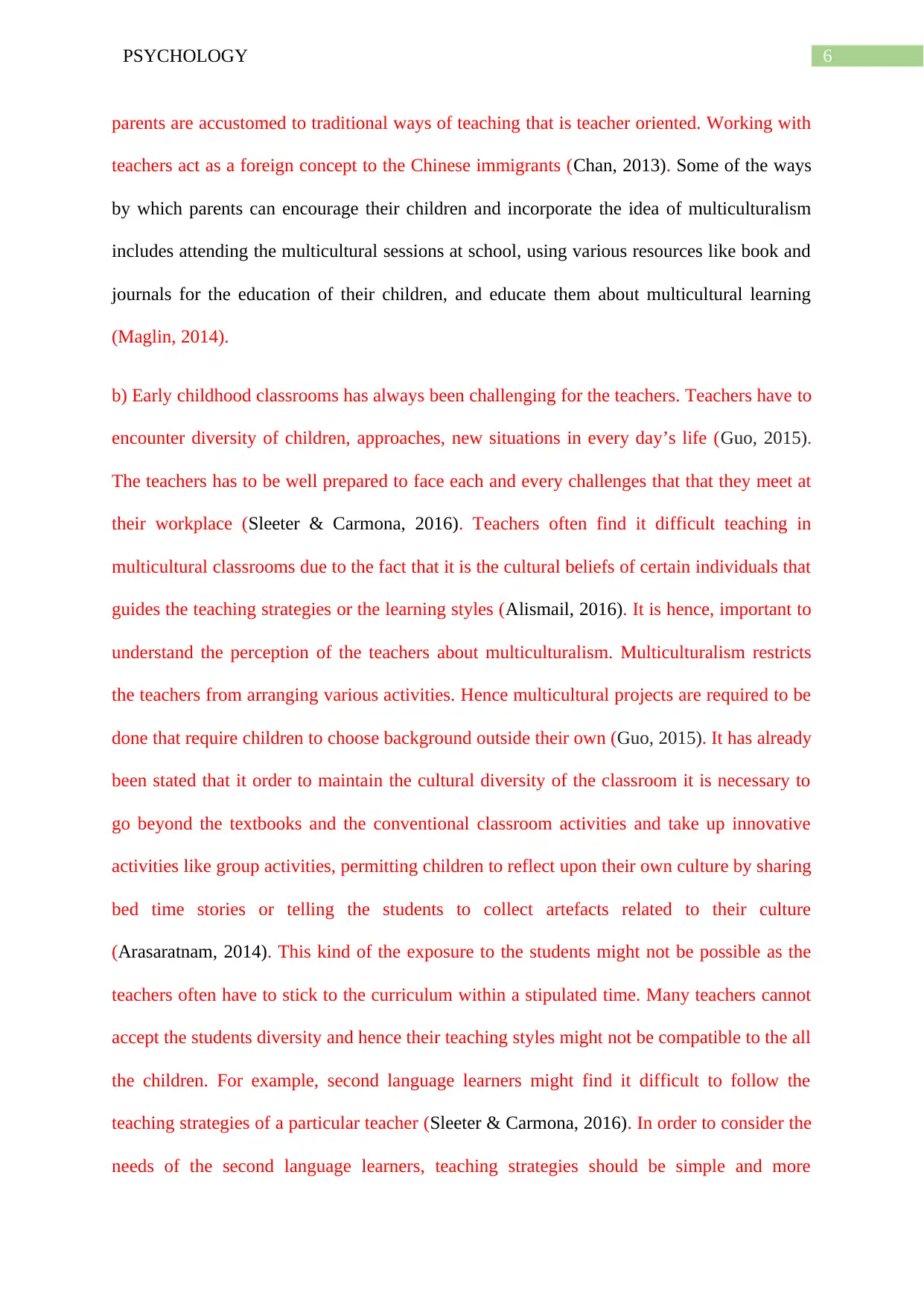
6PSYCHOLOGY
parents are accustomed to traditional ways of teaching that is teacher oriented. Working with
teachers act as a foreign concept to the Chinese immigrants (Chan, 2013). Some of the ways
by which parents can encourage their children and incorporate the idea of multiculturalism
includes attending the multicultural sessions at school, using various resources like book and
journals for the education of their children, and educate them about multicultural learning
(Maglin, 2014).
b) Early childhood classrooms has always been challenging for the teachers. Teachers have to
encounter diversity of children, approaches, new situations in every day’s life (Guo, 2015).
The teachers has to be well prepared to face each and every challenges that that they meet at
their workplace (Sleeter & Carmona, 2016). Teachers often find it difficult teaching in
multicultural classrooms due to the fact that it is the cultural beliefs of certain individuals that
guides the teaching strategies or the learning styles (Alismail, 2016). It is hence, important to
understand the perception of the teachers about multiculturalism. Multiculturalism restricts
the teachers from arranging various activities. Hence multicultural projects are required to be
done that require children to choose background outside their own (Guo, 2015). It has already
been stated that it order to maintain the cultural diversity of the classroom it is necessary to
go beyond the textbooks and the conventional classroom activities and take up innovative
activities like group activities, permitting children to reflect upon their own culture by sharing
bed time stories or telling the students to collect artefacts related to their culture
(Arasaratnam, 2014). This kind of the exposure to the students might not be possible as the
teachers often have to stick to the curriculum within a stipulated time. Many teachers cannot
accept the students diversity and hence their teaching styles might not be compatible to the all
the children. For example, second language learners might find it difficult to follow the
teaching strategies of a particular teacher (Sleeter & Carmona, 2016). In order to consider the
needs of the second language learners, teaching strategies should be simple and more
parents are accustomed to traditional ways of teaching that is teacher oriented. Working with
teachers act as a foreign concept to the Chinese immigrants (Chan, 2013). Some of the ways
by which parents can encourage their children and incorporate the idea of multiculturalism
includes attending the multicultural sessions at school, using various resources like book and
journals for the education of their children, and educate them about multicultural learning
(Maglin, 2014).
b) Early childhood classrooms has always been challenging for the teachers. Teachers have to
encounter diversity of children, approaches, new situations in every day’s life (Guo, 2015).
The teachers has to be well prepared to face each and every challenges that that they meet at
their workplace (Sleeter & Carmona, 2016). Teachers often find it difficult teaching in
multicultural classrooms due to the fact that it is the cultural beliefs of certain individuals that
guides the teaching strategies or the learning styles (Alismail, 2016). It is hence, important to
understand the perception of the teachers about multiculturalism. Multiculturalism restricts
the teachers from arranging various activities. Hence multicultural projects are required to be
done that require children to choose background outside their own (Guo, 2015). It has already
been stated that it order to maintain the cultural diversity of the classroom it is necessary to
go beyond the textbooks and the conventional classroom activities and take up innovative
activities like group activities, permitting children to reflect upon their own culture by sharing
bed time stories or telling the students to collect artefacts related to their culture
(Arasaratnam, 2014). This kind of the exposure to the students might not be possible as the
teachers often have to stick to the curriculum within a stipulated time. Many teachers cannot
accept the students diversity and hence their teaching styles might not be compatible to the all
the children. For example, second language learners might find it difficult to follow the
teaching strategies of a particular teacher (Sleeter & Carmona, 2016). In order to consider the
needs of the second language learners, teaching strategies should be simple and more
Paraphrase This Document
Need a fresh take? Get an instant paraphrase of this document with our AI Paraphraser

7PSYCHOLOGY
schematic diagrams has to be used other than narrative teaching. Teachers of multicultural
classroom might find the parents having distinct expectations that the others regarding the
classroom practices (Arasaratnam, 2014). Again, multiculturalism in the classroom might
give rise to conflicts of interests in the early childhood classroom and among the parents
(Arasaratnam, 2014). In order to manage a diverse classroom, the teachers require knowledge
and skills for creating a multicultural environment for learning and teaching. During the
initial teaching process the teachers should acquire the basic teaching and the learning skills
for working in a multicultural school (Sleeter & Carmona, 2016). It is necessary to integrate a
diverse reading list demonstrating the universal human experiences across the culture. Active
community participation and social activism required (Akhmehtsin et al., 2017). Childcare
developer should incorporates various programs which are usually expected to provide
children with diverse experiences outside their groups and cultures (Akhmehtsin et al., 2017).
This ultimately provides the opportunities to instill in them a feeling of respect, tolerance and
acceptance of the differences among various children due to their culture (Banks, 2015).
Teachers often lack the knowledge of Multiculturalism and the way of implementing them in
children (Spoonley, 2015). According to majority of the teachers, the contribution approach
is useful in the education processes of early childhood (Henson, 2015).The transformation
approach has been found to be useful which has been simultaneously found to be following
an anti-bias method in various trainings and programs. The importance of teachers lies in the
fact they should understand and comprehend the critical understandings of the concept and its
fruitful implementation through various programs (Russel & Russel, 2014).
Early childhood sustainability and the workforce are important as it has specific
implications for the national productivity along with the families. Attempts for addressing the
various challenges are important as they are often insufficient for the sustenance of the early
childhood and the workforce in the long term (Cumming, Sumsion & Wong, 2015). The most
schematic diagrams has to be used other than narrative teaching. Teachers of multicultural
classroom might find the parents having distinct expectations that the others regarding the
classroom practices (Arasaratnam, 2014). Again, multiculturalism in the classroom might
give rise to conflicts of interests in the early childhood classroom and among the parents
(Arasaratnam, 2014). In order to manage a diverse classroom, the teachers require knowledge
and skills for creating a multicultural environment for learning and teaching. During the
initial teaching process the teachers should acquire the basic teaching and the learning skills
for working in a multicultural school (Sleeter & Carmona, 2016). It is necessary to integrate a
diverse reading list demonstrating the universal human experiences across the culture. Active
community participation and social activism required (Akhmehtsin et al., 2017). Childcare
developer should incorporates various programs which are usually expected to provide
children with diverse experiences outside their groups and cultures (Akhmehtsin et al., 2017).
This ultimately provides the opportunities to instill in them a feeling of respect, tolerance and
acceptance of the differences among various children due to their culture (Banks, 2015).
Teachers often lack the knowledge of Multiculturalism and the way of implementing them in
children (Spoonley, 2015). According to majority of the teachers, the contribution approach
is useful in the education processes of early childhood (Henson, 2015).The transformation
approach has been found to be useful which has been simultaneously found to be following
an anti-bias method in various trainings and programs. The importance of teachers lies in the
fact they should understand and comprehend the critical understandings of the concept and its
fruitful implementation through various programs (Russel & Russel, 2014).
Early childhood sustainability and the workforce are important as it has specific
implications for the national productivity along with the families. Attempts for addressing the
various challenges are important as they are often insufficient for the sustenance of the early
childhood and the workforce in the long term (Cumming, Sumsion & Wong, 2015). The most
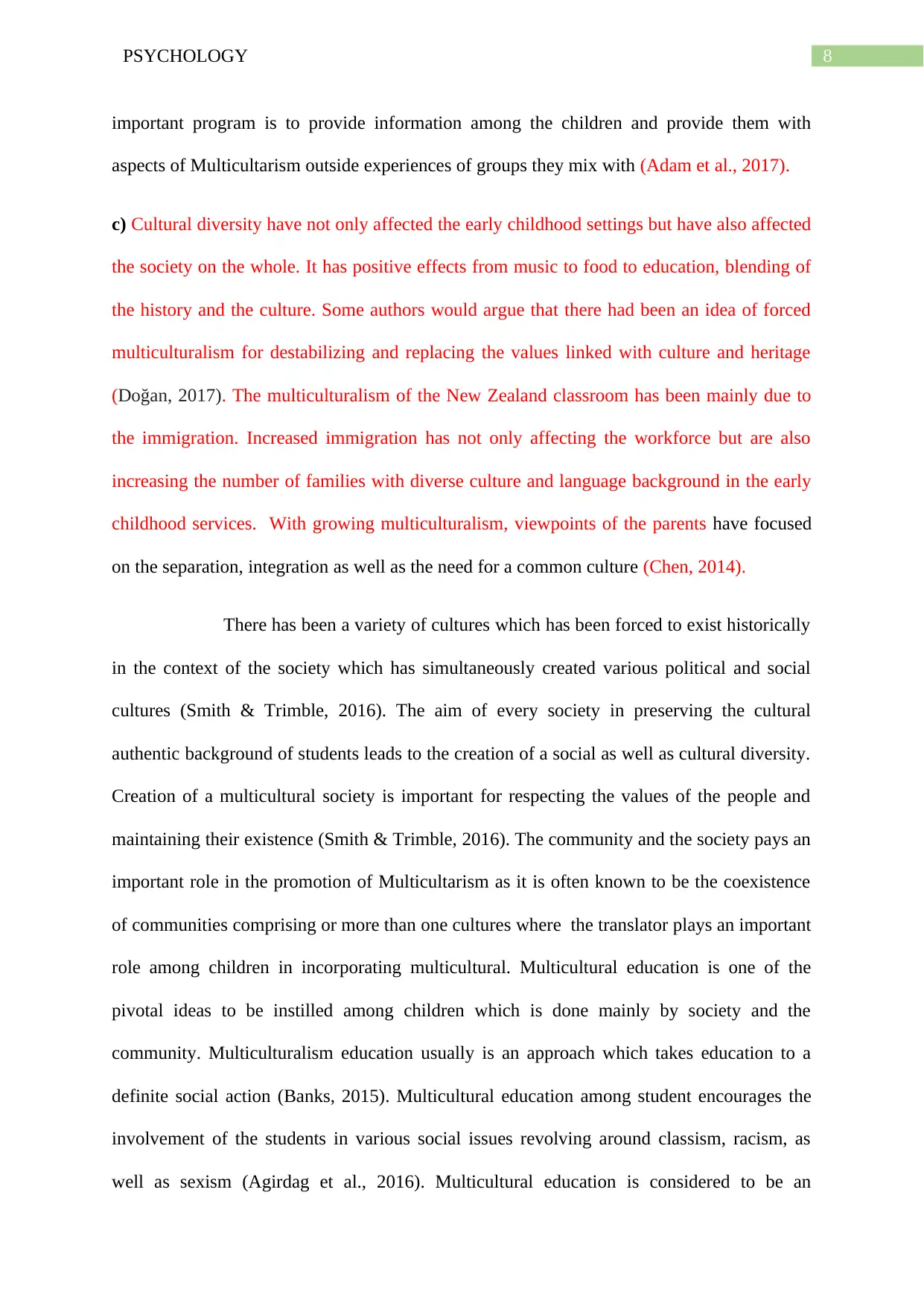
8PSYCHOLOGY
important program is to provide information among the children and provide them with
aspects of Multicultarism outside experiences of groups they mix with (Adam et al., 2017).
c) Cultural diversity have not only affected the early childhood settings but have also affected
the society on the whole. It has positive effects from music to food to education, blending of
the history and the culture. Some authors would argue that there had been an idea of forced
multiculturalism for destabilizing and replacing the values linked with culture and heritage
(Doğan, 2017). The multiculturalism of the New Zealand classroom has been mainly due to
the immigration. Increased immigration has not only affecting the workforce but are also
increasing the number of families with diverse culture and language background in the early
childhood services. With growing multiculturalism, viewpoints of the parents have focused
on the separation, integration as well as the need for a common culture (Chen, 2014).
There has been a variety of cultures which has been forced to exist historically
in the context of the society which has simultaneously created various political and social
cultures (Smith & Trimble, 2016). The aim of every society in preserving the cultural
authentic background of students leads to the creation of a social as well as cultural diversity.
Creation of a multicultural society is important for respecting the values of the people and
maintaining their existence (Smith & Trimble, 2016). The community and the society pays an
important role in the promotion of Multicultarism as it is often known to be the coexistence
of communities comprising or more than one cultures where the translator plays an important
role among children in incorporating multicultural. Multicultural education is one of the
pivotal ideas to be instilled among children which is done mainly by society and the
community. Multiculturalism education usually is an approach which takes education to a
definite social action (Banks, 2015). Multicultural education among student encourages the
involvement of the students in various social issues revolving around classism, racism, as
well as sexism (Agirdag et al., 2016). Multicultural education is considered to be an
important program is to provide information among the children and provide them with
aspects of Multicultarism outside experiences of groups they mix with (Adam et al., 2017).
c) Cultural diversity have not only affected the early childhood settings but have also affected
the society on the whole. It has positive effects from music to food to education, blending of
the history and the culture. Some authors would argue that there had been an idea of forced
multiculturalism for destabilizing and replacing the values linked with culture and heritage
(Doğan, 2017). The multiculturalism of the New Zealand classroom has been mainly due to
the immigration. Increased immigration has not only affecting the workforce but are also
increasing the number of families with diverse culture and language background in the early
childhood services. With growing multiculturalism, viewpoints of the parents have focused
on the separation, integration as well as the need for a common culture (Chen, 2014).
There has been a variety of cultures which has been forced to exist historically
in the context of the society which has simultaneously created various political and social
cultures (Smith & Trimble, 2016). The aim of every society in preserving the cultural
authentic background of students leads to the creation of a social as well as cultural diversity.
Creation of a multicultural society is important for respecting the values of the people and
maintaining their existence (Smith & Trimble, 2016). The community and the society pays an
important role in the promotion of Multicultarism as it is often known to be the coexistence
of communities comprising or more than one cultures where the translator plays an important
role among children in incorporating multicultural. Multicultural education is one of the
pivotal ideas to be instilled among children which is done mainly by society and the
community. Multiculturalism education usually is an approach which takes education to a
definite social action (Banks, 2015). Multicultural education among student encourages the
involvement of the students in various social issues revolving around classism, racism, as
well as sexism (Agirdag et al., 2016). Multicultural education is considered to be an
⊘ This is a preview!⊘
Do you want full access?
Subscribe today to unlock all pages.

Trusted by 1+ million students worldwide
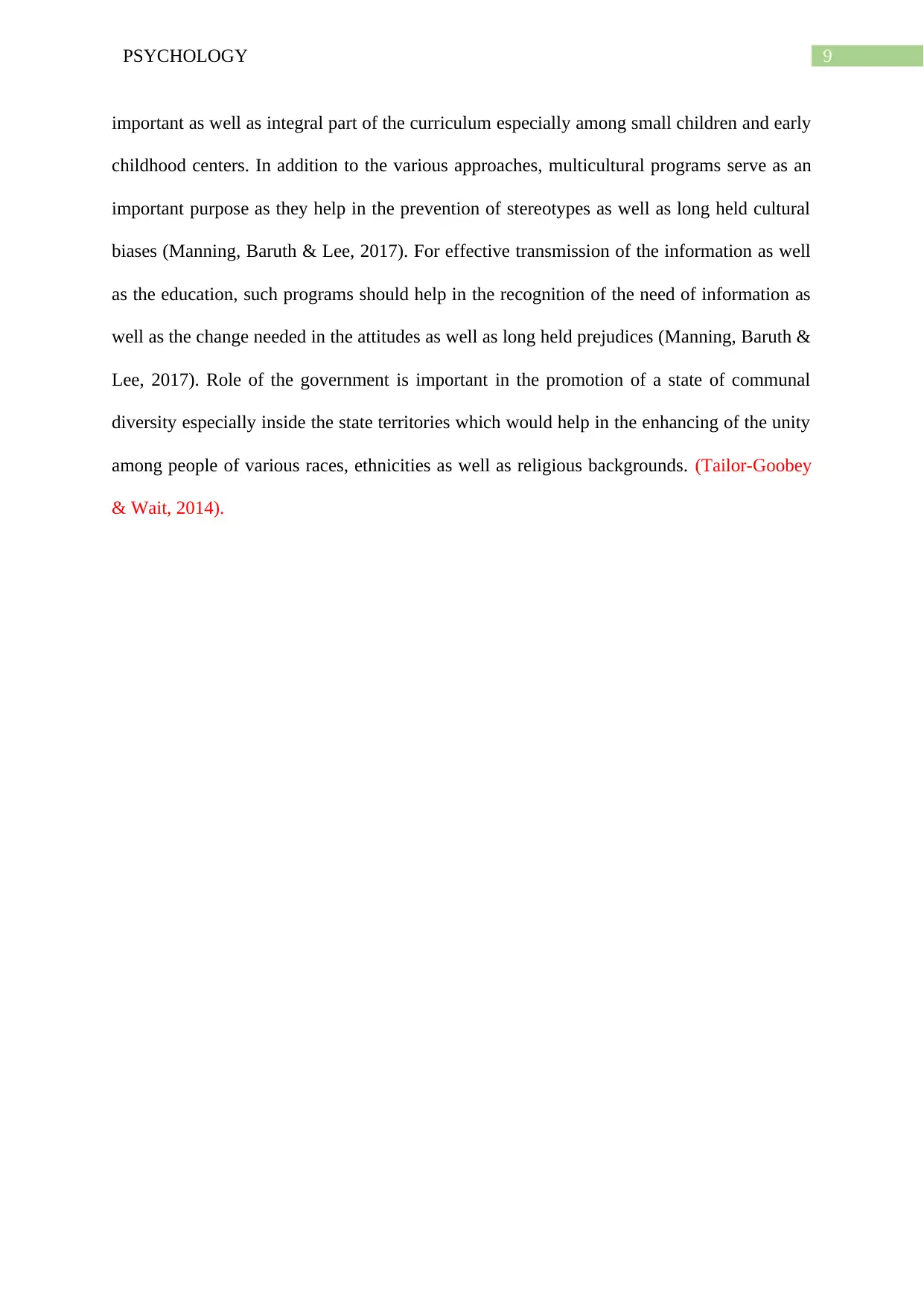
9PSYCHOLOGY
important as well as integral part of the curriculum especially among small children and early
childhood centers. In addition to the various approaches, multicultural programs serve as an
important purpose as they help in the prevention of stereotypes as well as long held cultural
biases (Manning, Baruth & Lee, 2017). For effective transmission of the information as well
as the education, such programs should help in the recognition of the need of information as
well as the change needed in the attitudes as well as long held prejudices (Manning, Baruth &
Lee, 2017). Role of the government is important in the promotion of a state of communal
diversity especially inside the state territories which would help in the enhancing of the unity
among people of various races, ethnicities as well as religious backgrounds. (Tailor-Goobey
& Wait, 2014).
important as well as integral part of the curriculum especially among small children and early
childhood centers. In addition to the various approaches, multicultural programs serve as an
important purpose as they help in the prevention of stereotypes as well as long held cultural
biases (Manning, Baruth & Lee, 2017). For effective transmission of the information as well
as the education, such programs should help in the recognition of the need of information as
well as the change needed in the attitudes as well as long held prejudices (Manning, Baruth &
Lee, 2017). Role of the government is important in the promotion of a state of communal
diversity especially inside the state territories which would help in the enhancing of the unity
among people of various races, ethnicities as well as religious backgrounds. (Tailor-Goobey
& Wait, 2014).
Paraphrase This Document
Need a fresh take? Get an instant paraphrase of this document with our AI Paraphraser

10PSYCHOLOGY
References
Adam, H., Barratt-Pugh, C., & Haig, Y. (2017). Book collections in long day care: Do they
reflect racial diversity?. Australasian Journal of Early Childhood, 42(2), 88.
Adam, H., Barratt-Pugh, C., & Haig, Y. (2017). Book collections in long day care: Do they
reflect racial diversity?. Australasian Journal of Early Childhood, 42(2), 88.
Agirdag, O., Merry, M. S., & Van Houtte, M. (2016). Teachers’ understanding of
multicultural education and the correlates of multicultural content integration in
Flanders. Education and Urban Society, 48(6), 556-582.
Akhmetshin, E. M., Makulov, S. I., Talysheva, I. A., Fedorova, S. Y., & Gubarkov, S. (2017).
Overcoming of intercultural barriers in the educational environment. Man in
India, 97(15), 281-288.
Alasuutari, M., Markström, A. M., & Vallberg-Roth, A. C. (2014). Assessment and
documentation in early childhood education. Routledge.
Alismail, H. A. (2016). Multicultural Education: Teachers' Perceptions and Preparation.
Journal of Education and Practice, 7(11), 139-146.
Alsubaie, M. A. (2015). Examples of Current Issues in the Multicultural Classroom. Journal
of Education and Practice, 6(10), 86-89.
Arasaratnam, L. A. (2014). A discussion of multiculturalism in Australia from educators’
perspective. SpringerPlus, 3(1), 36.
Aydin, H., & Tonbuloglu, B. (2014). Graduate Students Perceptions' on Multicultural
Education: A Qualitative Case Study. Eurasian Journal of Educational Research, 57,
29-50.
References
Adam, H., Barratt-Pugh, C., & Haig, Y. (2017). Book collections in long day care: Do they
reflect racial diversity?. Australasian Journal of Early Childhood, 42(2), 88.
Adam, H., Barratt-Pugh, C., & Haig, Y. (2017). Book collections in long day care: Do they
reflect racial diversity?. Australasian Journal of Early Childhood, 42(2), 88.
Agirdag, O., Merry, M. S., & Van Houtte, M. (2016). Teachers’ understanding of
multicultural education and the correlates of multicultural content integration in
Flanders. Education and Urban Society, 48(6), 556-582.
Akhmetshin, E. M., Makulov, S. I., Talysheva, I. A., Fedorova, S. Y., & Gubarkov, S. (2017).
Overcoming of intercultural barriers in the educational environment. Man in
India, 97(15), 281-288.
Alasuutari, M., Markström, A. M., & Vallberg-Roth, A. C. (2014). Assessment and
documentation in early childhood education. Routledge.
Alismail, H. A. (2016). Multicultural Education: Teachers' Perceptions and Preparation.
Journal of Education and Practice, 7(11), 139-146.
Alsubaie, M. A. (2015). Examples of Current Issues in the Multicultural Classroom. Journal
of Education and Practice, 6(10), 86-89.
Arasaratnam, L. A. (2014). A discussion of multiculturalism in Australia from educators’
perspective. SpringerPlus, 3(1), 36.
Aydin, H., & Tonbuloglu, B. (2014). Graduate Students Perceptions' on Multicultural
Education: A Qualitative Case Study. Eurasian Journal of Educational Research, 57,
29-50.
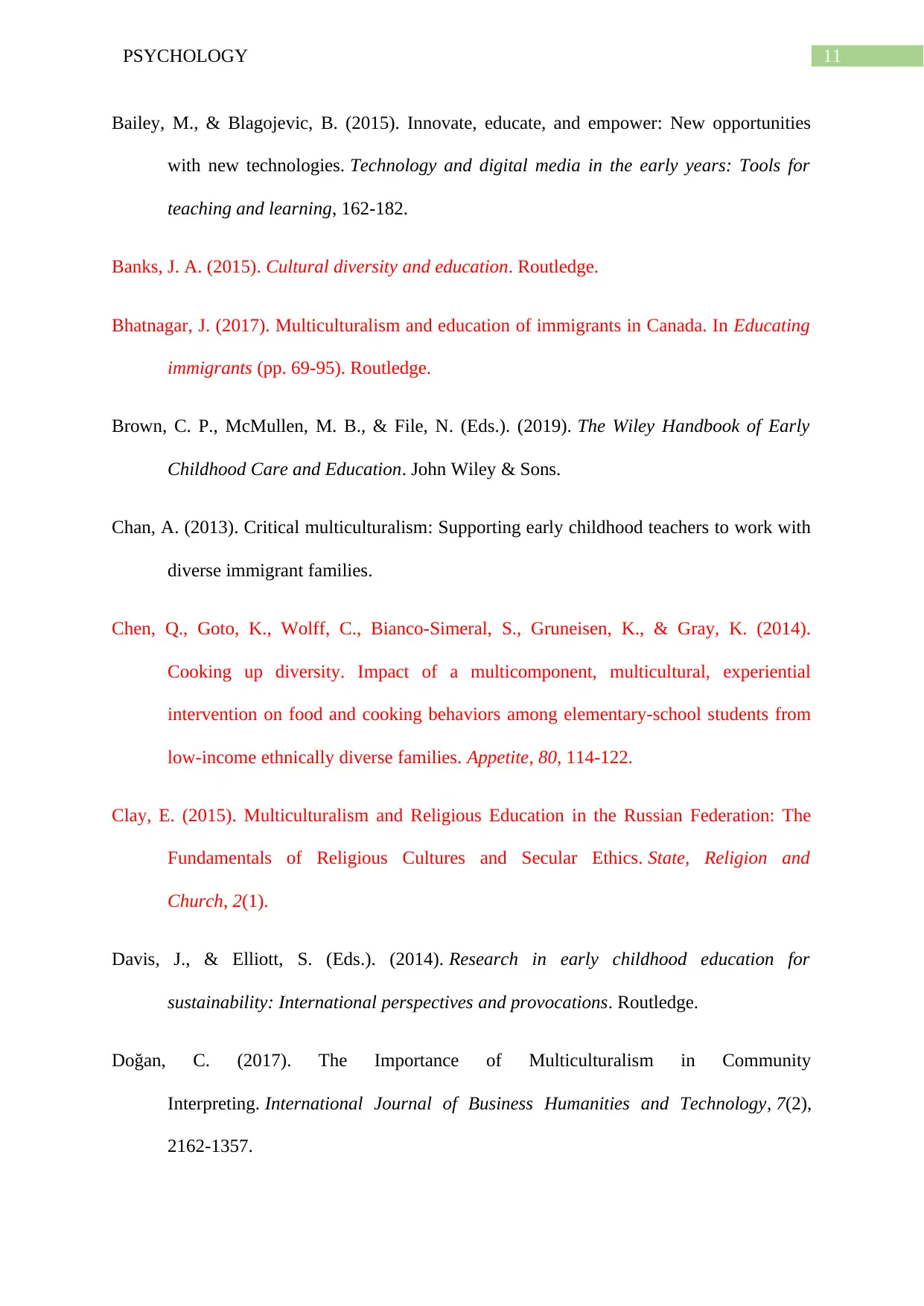
11PSYCHOLOGY
Bailey, M., & Blagojevic, B. (2015). Innovate, educate, and empower: New opportunities
with new technologies. Technology and digital media in the early years: Tools for
teaching and learning, 162-182.
Banks, J. A. (2015). Cultural diversity and education. Routledge.
Bhatnagar, J. (2017). Multiculturalism and education of immigrants in Canada. In Educating
immigrants (pp. 69-95). Routledge.
Brown, C. P., McMullen, M. B., & File, N. (Eds.). (2019). The Wiley Handbook of Early
Childhood Care and Education. John Wiley & Sons.
Chan, A. (2013). Critical multiculturalism: Supporting early childhood teachers to work with
diverse immigrant families.
Chen, Q., Goto, K., Wolff, C., Bianco-Simeral, S., Gruneisen, K., & Gray, K. (2014).
Cooking up diversity. Impact of a multicomponent, multicultural, experiential
intervention on food and cooking behaviors among elementary-school students from
low-income ethnically diverse families. Appetite, 80, 114-122.
Clay, E. (2015). Multiculturalism and Religious Education in the Russian Federation: The
Fundamentals of Religious Cultures and Secular Ethics. State, Religion and
Church, 2(1).
Davis, J., & Elliott, S. (Eds.). (2014). Research in early childhood education for
sustainability: International perspectives and provocations. Routledge.
Doğan, C. (2017). The Importance of Multiculturalism in Community
Interpreting. International Journal of Business Humanities and Technology, 7(2),
2162-1357.
Bailey, M., & Blagojevic, B. (2015). Innovate, educate, and empower: New opportunities
with new technologies. Technology and digital media in the early years: Tools for
teaching and learning, 162-182.
Banks, J. A. (2015). Cultural diversity and education. Routledge.
Bhatnagar, J. (2017). Multiculturalism and education of immigrants in Canada. In Educating
immigrants (pp. 69-95). Routledge.
Brown, C. P., McMullen, M. B., & File, N. (Eds.). (2019). The Wiley Handbook of Early
Childhood Care and Education. John Wiley & Sons.
Chan, A. (2013). Critical multiculturalism: Supporting early childhood teachers to work with
diverse immigrant families.
Chen, Q., Goto, K., Wolff, C., Bianco-Simeral, S., Gruneisen, K., & Gray, K. (2014).
Cooking up diversity. Impact of a multicomponent, multicultural, experiential
intervention on food and cooking behaviors among elementary-school students from
low-income ethnically diverse families. Appetite, 80, 114-122.
Clay, E. (2015). Multiculturalism and Religious Education in the Russian Federation: The
Fundamentals of Religious Cultures and Secular Ethics. State, Religion and
Church, 2(1).
Davis, J., & Elliott, S. (Eds.). (2014). Research in early childhood education for
sustainability: International perspectives and provocations. Routledge.
Doğan, C. (2017). The Importance of Multiculturalism in Community
Interpreting. International Journal of Business Humanities and Technology, 7(2),
2162-1357.
⊘ This is a preview!⊘
Do you want full access?
Subscribe today to unlock all pages.

Trusted by 1+ million students worldwide
1 out of 16
Related Documents
Your All-in-One AI-Powered Toolkit for Academic Success.
+13062052269
info@desklib.com
Available 24*7 on WhatsApp / Email
![[object Object]](/_next/static/media/star-bottom.7253800d.svg)
Unlock your academic potential
Copyright © 2020–2026 A2Z Services. All Rights Reserved. Developed and managed by ZUCOL.





